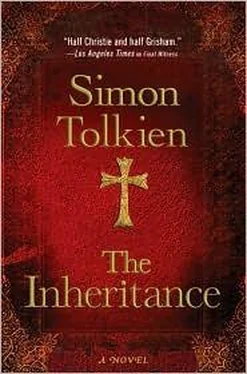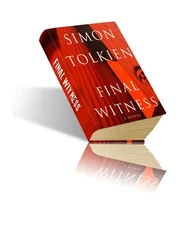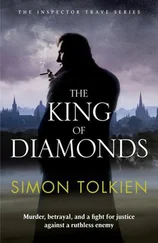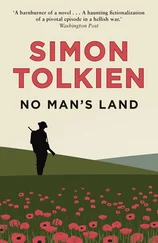Simon Tolkien - The Inheritance
Здесь есть возможность читать онлайн «Simon Tolkien - The Inheritance» — ознакомительный отрывок электронной книги совершенно бесплатно, а после прочтения отрывка купить полную версию. В некоторых случаях можно слушать аудио, скачать через торрент в формате fb2 и присутствует краткое содержание. Жанр: Полицейский детектив, на английском языке. Описание произведения, (предисловие) а так же отзывы посетителей доступны на портале библиотеки ЛибКат.
- Название:The Inheritance
- Автор:
- Жанр:
- Год:неизвестен
- ISBN:нет данных
- Рейтинг книги:4 / 5. Голосов: 1
-
Избранное:Добавить в избранное
- Отзывы:
-
Ваша оценка:
- 80
- 1
- 2
- 3
- 4
- 5
The Inheritance: краткое содержание, описание и аннотация
Предлагаем к чтению аннотацию, описание, краткое содержание или предисловие (зависит от того, что написал сам автор книги «The Inheritance»). Если вы не нашли необходимую информацию о книге — напишите в комментариях, мы постараемся отыскать её.
The Inheritance — читать онлайн ознакомительный отрывок
Ниже представлен текст книги, разбитый по страницам. Система сохранения места последней прочитанной страницы, позволяет с удобством читать онлайн бесплатно книгу «The Inheritance», без необходимости каждый раз заново искать на чём Вы остановились. Поставьте закладку, и сможете в любой момент перейти на страницу, на которой закончили чтение.
Интервал:
Закладка:
“Would you spare John Cade?”
“No, not that. I said almost anything,” said Mary with a half smile.
“In my experience murderers always blame their accomplices,” said Trave, refusing to believe in Mary’s sincerity.
“But I’m not blaming anyone. Paul didn’t kill John Cade; I did. It had to be me, because it wasn’t a murder; it was an execution, an act of justice. If any man deserved to die, it was that bastard-surely to God you can see that.”
Mary stopped suddenly, realising that anger had got the better of her, and then breathed deeply, reasserting her self-control. “Well, let’s not quibble over words. You did well, Inspector. Better than I expected. It’s one thing to discover that my parents had a daughter, quite another to find out that she survived John Cade and turned into me.”
“I got lucky,” said Trave, making a conscious decision to be less confrontational. If Mary was here to help him save Stephen, he wasn’t going to discourage her. “Your friend in the kitchen complained about Cade to the police in Moirtier, and one of them told me about it,” he explained.
“Laroche, you mean. That was more than ten years ago, and I thought Paul gave him a false name. Still, whatever he said, he shouldn’t have gone to the police. We both realised that afterward. But it was early days, and we were naive back then. We thought somebody might help us, that the world was a fair place. And Paul thought I should have my inheritance. Not that I ever wanted it. A burnt-out house with bad memories and a few outbuildings. La belle France is welcome to it, as far as I’m concerned.”
Trave noticed the bitterness that had crept into Mary’s voice as she was speaking. It was like the cover of a deep, empty well had been momentarily removed, revealing the unplumbed depths of black cynicism that lay underneath.
“You see, neither of us understood back then that my nonexistence was my greatest advantage. Cade never knew about me until the second before he died. I hadn’t been thought of when he first came to the house, and my mother was upstairs, seven months pregnant, when he came back at the end of 1938 and my father kicked him out.”
“But what about in 1944? What happened then?” asked Trave.
“I was in the church tower, and so they didn’t see me watching them. Cade and Ritter and stupid Jimmy Carson. If they’d asked questions afterward, people would’ve said I died in the fire with sweet old Marguerite. That was the story my friends spread about. But they had no reason to ask questions. Not then and not later. Cade always thought it was Carson who took a shot at him in 1956 and sent him that blackmail letter a year later. He never knew it was me because I didn’t exist. My birth certificate was destroyed by the Germans when they attacked Rouen, and there was never a death certificate because I didn’t die. It was easy. Stephen’s lawyers never found out about me either. They sent a man out there to ask questions, but I guess he didn’t get lucky like you did.
“Anyway, from the church, I got as far as a friend’s house, and he sent me on to Paul’s father. Hundreds of miles away. I wasn’t even six, but I didn’t forget. And Paul looked after me after that. He made me what I am.”
Trave decided against asking Mary whether she thought this was a good thing or a bad thing, because Paul was back now, leaning against the wall by the door, and although he continued to remain silent Trave had no idea how much he understood of the conversation.
“What do you want me to do?” Trave asked.
“Write my statement over at that table,” said Mary. “Then when we’re done, I’ll sign it, and you can take it up to London in the morning. Give it to Stephen’s barrister. He’ll know what to do. They can’t hang Stephen if I’ve confessed.”
Trave wasn’t so sure, but he picked up the mug of black coffee that Paul had put in front of him and went over to the table where he’d got slowly used to eating his meals alone in the months since Vanessa left him. Just as he’d finished sitting down, the telephone rang. Instinctively he put out his hand to answer it, but Mary’s voice stopped him.
“I’ll shoot you, Inspector, if you do that,” she said in a flat, hard voice. “I don’t want to, but I will.”
Trave wasn’t sure he believed her, but there was no way he was going to put her assertion to the test. Not with the cold-eyed Frenchman standing behind him. The telephone rang on unanswered for nearly a minute, and then, when it had stopped, Paul put pen and paper in front of him, and Trave began to write down what Mary was telling him. After a few sentences she gave the gun to Paul and began walking up and down the room as she dictated her statement, speaking quickly and with little hesitation. It seemed obvious to Trave that she had prepared a great deal of what she had to say in advance, but a growing passion that crept into her voice as she told her story made him realise that she’d been waiting for this moment for a long, long time.
“My name is Marie Rocard,” she began, “and I was born on January third, 1939. My parents, Henri and Mathilde Rocard, were killed by John Cade and Reginald Ritter on August twenty-eighth, 1944, at Marjean Church in Normandy. There was a third man called Carson who kept watch outside. They killed our servants, Albert and Marguerite too, and they set fire to our house, and then they blamed it all on the Nazis, who’d been using the chateau as a headquarters since 1942. Cade believed that there were no survivors because he never knew that my parents had a child.
“Afterward, with the help of friends, I escaped to another part of France and took on a new identity, and then, when I was old enough, I planned out how to punish John Cade for what he’d done. For as long as I can remember I thought of nothing else, but I also knew it wouldn’t be easy. In 1956 I enticed him to Marjean and shot him with a rifle but he recovered from his wound, and after that I couldn’t find a way to get him to leave his house, however hard I tried. He was a rich man who lived behind high walls and electronic gates, and a break-in was simply not practical. I had to get close to him to make sure he died, but that meant that someone else in the house would have to take the blame for the murder. I decided on Cade’s son, Stephen, who was a student at Oxford University. He would be my passport into Moreton Manor House, and then the state would hang him for what I’d done. Back then I held the whole Cade family responsible for the father’s crime. But I was wrong. I wish now that I acted differently after the murder, that I didn’t stand aside and watch Stephen suffer as he has. But what’s done is done. I cannot make amends. All I can do now is save him from the gallows.”
“What about Ritter?” asked Trave, interrupting. “You said it was Ritter as well as Cade that killed your parents.”
“He would’ve come afterward. But you saved me the trouble, Inspector.” Mary smiled briefly, as if acknowledging a debt. “And Ritter killed Carson. Pushed him from a train outside Leicester. But you probably know that already, don’t you?”
“I guessed,” said Trave, picking up his pen and trying to avoid looking at Paul, who still had the gun trained on his head. Unlike Mary, his hand was entirely steady.
“Where was I?” said Mary. “Oh yes, Stephen. Always Stephen. He was twenty-one years old when I first met him and very impressionable. And he was estranged from his father, which was always going to make him the prime suspect. It didn’t take him long to fall in love with me. That was the easy part. And then, when he couldn’t do without me anymore, I told him that my mother was sick and I needed money for an operation. He believed me. He had no reason not to. How was he to know that my mother was well beyond medical help, rotting in her grave on the other side of the Channel?”
Читать дальшеИнтервал:
Закладка:
Похожие книги на «The Inheritance»
Представляем Вашему вниманию похожие книги на «The Inheritance» списком для выбора. Мы отобрали схожую по названию и смыслу литературу в надежде предоставить читателям больше вариантов отыскать новые, интересные, ещё непрочитанные произведения.
Обсуждение, отзывы о книге «The Inheritance» и просто собственные мнения читателей. Оставьте ваши комментарии, напишите, что Вы думаете о произведении, его смысле или главных героях. Укажите что конкретно понравилось, а что нет, и почему Вы так считаете.












